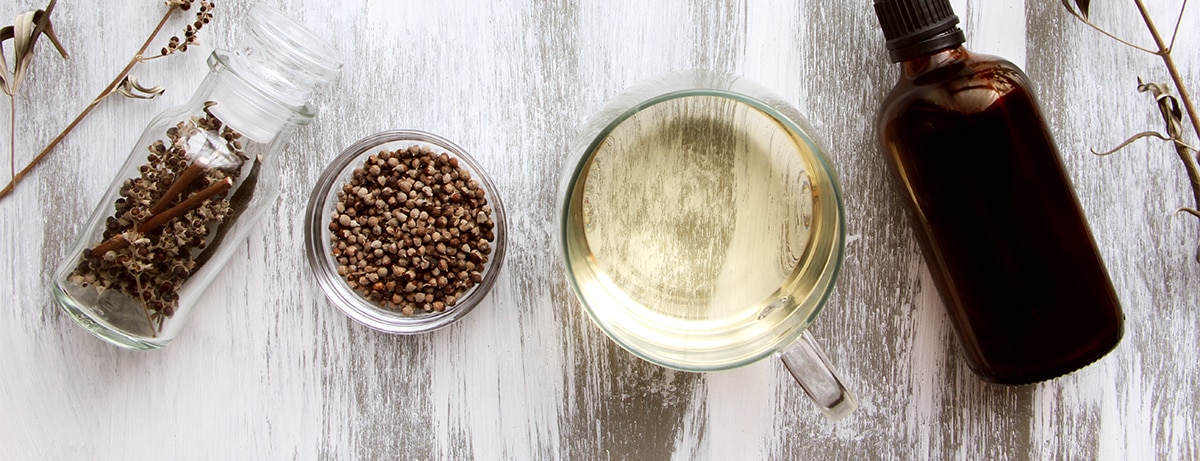10% off £35
Vitex agnus castus (chasteberry): benefits, dosage, side-effects & supplements

Summary
1What is agnus castus?
Agnus castus is a shrub that grows in Mediterranean countries and central Asia...
2How much agnus castus is safe to take?
The European Medicines Agency suggests that 20mg a day of agnus castus is safe to take, to treat PMS...
3When to take vitex agnus castus supplements?
You can take agnus castus supplements in the morning or in the evening – it doesn’t really matter which. Just make sure you take it at roughly...
Do you get PMS symptoms every month, including tender breasts or mood swings? Meet your go-to herbal remedy that could help!
Find out all about agnus castus, including what it does, the benefits of taking it and how much you might need.

What is agnus castus?
FAQs about agnus castus
7 benefits of agnus castus
1. Agnus castus for PMS symptom relief
2. Could help soothe tender breasts
3. Could help ease menopausal symptoms
4. Could help with fertility problems
5. May help prevent insect bites
6. A potential link between agnus castus and PCOS
7. Could help ease hormone-induced anxiety

Agnus castus dosage
How much agnus castus is safe to take?
How long can you take agnus castus for?
Agnus castus side effects
9 side effects of agnus castus
- Allergic reactions
- Swelling
- Difficulty breathing
- Headaches
- Nausea
- Stomach aches
- Irregular periods
- Trouble sleeping
- Weight gain
Does agnus castus cause weight gain?
Yes, weight gain is one of the potential side effects of taking agnus castus, but it is not very common.
Who shouldn’t take agnus castus?
Because of the herb’s effect on the pituitary gland, those with a pituitary disorder should not take it without talking to their doctor first.
If you're taking any other hormone medications, such as the contraceptive pill or hormone-replacement therapy (HRT), do not take agnus castus without proper medical advice from your GP or a healthcare professional.23
When should you take vitex agnus castus supplements?
What agnus castus/chasteberry supplements are available?
- Agnus castus drops
- Agnus castus tablets
- Agnus castus liquid
- Agnus castus capsules
The final say
- Agnus castus extract comes from a shrub grown in Mediterranean countries and central Asia
- The plant has been used for centuries to tackle female hormonal issues like easing PMS symptoms and supporting fertility
- You will usually find it in tablet, capsule and liquid form
- Agnus castus is likely safe for most people, but there are a few known side effects like allergic reactions, difficulty breathing and potential weight gain
- People with a pituitary gland disorder or those with hormone medications (like the contraceptive pill) should not take agnus castus without seeking medical advice from a GP or healthcare professional first
- https://www.ema.europa.eu/en/medicines/herbal/agni-casti-fructus
- https://www.ema.europa.eu/documents/herbal-report/final-assessment-report-vitex-agnus-castus-l-fructus-revision-1_en.pdf
- https://www.rhs.org.uk/Plants/Nurseries-Search-Result?query=43844
- https://www.ncbi.nlm.nih.gov/pubmed/15783241
- https://www.ncbi.nlm.nih.gov/pubmed/22359078
- https://www.ncbi.nlm.nih.gov/pubmed/10787228
- http://www.uofmhealth.org/health-library/hn-2181002
- https://www.hopkinsmedicine.org/healthlibrary/conditions/breast_health/mastalgia_breast_pain_85,P00154
- https://www.ncbi.nlm.nih.gov/pubmed/12809367
- https://www.ncbi.nlm.nih.gov/pubmed/22359078
- http://anyflip.com/kfvb/wlzq/basic
- https://eurekamag.com/pdf/004/004384381.pdf
- https://www.healthline.com/nutrition/vitex#womens-reproduction
- https://www.ncbi.nlm.nih.gov/pubmed/8369008
- https://www.ncbi.nlm.nih.gov/pubmed/15682335
- https://www.ncbi.nlm.nih.gov/pubmed/20054562
- https://www.ncbi.nlm.nih.gov/pubmed/18353565
- https://www.ncbi.nlm.nih.gov/pubmed/20054562
- https://ijbcp.com/index.php/ijbcp/article/view/1857
- https://www.researchgate.net/publication/307813918_The_Effects_of_Vitex_Agnus_Castus_and_Vitamin_E_on_Anxiety_in_women_with_Mastalgia_A_Randomized_Clinical_Trial
- https://www.ema.europa.eu/documents/herbal-report/final-assessment-report-vitex-agnus-castus-l-fructus-revision-1_en.pdf
- https://www.ema.europa.eu/en/medicines/herbal/agni-casti-fructus
- https://www.ema.europa.eu/documents/herbal-report/final-assessment-report-vitex-agnus-castus-l-fructus-revision-1_en.pdf
The advice in this article is for information only and should not replace medical care. Please check with your GP or healthcare professional before trying any supplements, treatments or remedies. Food supplements must not be used as a substitute for a varied and balanced diet and a healthy lifestyle.














